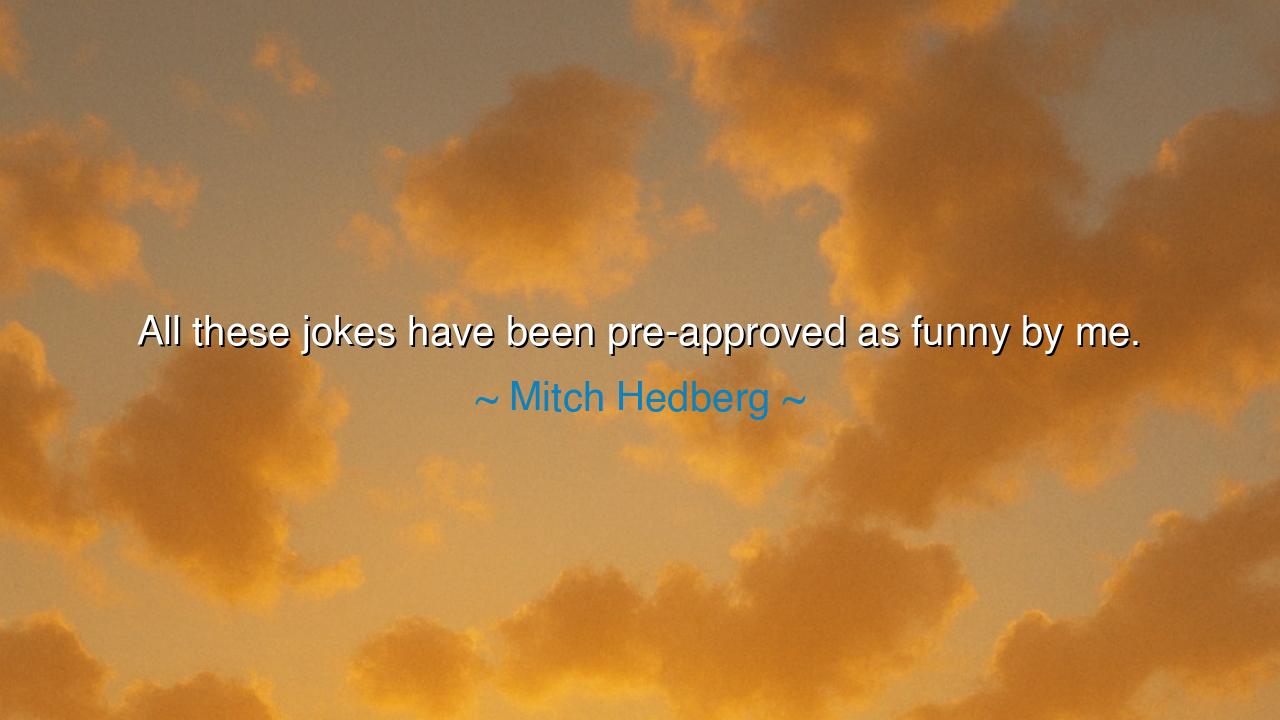
All these jokes have been pre-approved as funny by me.






“All these jokes have been pre-approved as funny by me.” Thus spoke Mitch Hedberg, the bard of the absurd, whose voice carried the strange harmony of wisdom and wit. Beneath his casual humor lies a hidden philosophy—one both self-aware and profound. In this single jest, Hedberg unveils a truth not only about comedy, but about art, confidence, and the eternal dance between creator and audience. What sounds like a lighthearted remark becomes, in the light of reflection, a teaching for all who seek to express themselves freely in a world of judgment.
For Hedberg, the joke was more than a line—it was a fragment of his being, a spark of his perspective made audible. When he says the jokes have been “pre-approved,” he speaks to the sacred autonomy of the artist, the one who creates not by committee but by conviction. He mocks the expectation that every idea must be tested, validated, or accepted before it can be spoken. In his humor, there is rebellion. He claims his own authority as a creator, declaring that what he finds funny is enough. This is not arrogance, but liberation—the freedom to define worth by one’s own measure rather than the approval of others.
This spirit echoes through the ages. The ancient poet Diogenes, who wandered Athens with a lantern in search of an honest man, also laughed at convention. When the philosophers of his time debated truth, he lived it with simplicity and mockery. His jokes, like Hedberg’s, were not designed to please but to provoke. Both men understood that humor—when it is honest—does not beg for acceptance. It stands as it is, unpolished yet radiant, trusting that truth itself will find its listeners. Hedberg’s “pre-approval” is this same ancient defiance: the courage to believe in one’s own voice amidst a chorus of doubt.
There is also irony in his statement, for it contains both confidence and humility. By saying his jokes are “pre-approved,” he acknowledges the risk of rejection. Every performer, every dreamer, faces the silence that may follow their offering. Yet Hedberg’s tone is playful, not bitter. He accepts this risk as part of the craft. To him, the laughter of others is a gift, but not a requirement. In this, he teaches us a deeper form of courage—to act, to speak, to create not for applause, but from authenticity. Like a philosopher of the modern stage, he reminds us that approval begins within the soul.
Consider, too, how this wisdom mirrors the path of all innovators. The sculptor Michelangelo once said he saw the angel in the marble and carved until he set it free. His vision was “pre-approved” by his own spirit long before the world recognized it. The audience could not see what he saw until the work was done. So it is with all creation—whether joke, poem, invention, or act of love. The creator must first trust their own perception, even when others cannot yet understand. Hedberg, through humor, teaches this timeless truth with a smile.
The meaning of his words also reminds us of the fragile balance between self-belief and connection. Humor, by its nature, is shared—it lives between speaker and listener. But the moment it becomes servile, when the comedian bends too much toward expectation, the laughter loses its purity. To laugh honestly, as to live honestly, requires freedom on both sides. The comedian must trust their instinct; the listener must open their heart. Thus, Hedberg’s “pre-approval” is a challenge to both: he invites us to meet him halfway, to see the world through his lens for a moment, without judgment.
So, dear listener, take this teaching into your own journey. Whatever your craft, your words, your dreams—pre-approve them yourself. Do not wait for permission to find joy in what you create. Trust your instincts as Hedberg trusted his humor. The world may not always laugh when you wish it to, nor applaud when you hope it will, but that does not diminish the truth of what you offer. To live authentically is to risk misunderstanding, yet still to speak.
For as Mitch Hedberg reminds us, the power of creation lies not in consensus, but in courage. Whether through laughter, art, or simple acts of honesty, approve your own voice before the world ever does. For the truly funny, the truly beautiful, and the truly true—these are born first in the heart of one who dares to believe in them. And that belief, once shared, becomes the spark that lights laughter, wisdom, and life itself.






AAdministratorAdministrator
Welcome, honored guests. Please leave a comment, we will respond soon